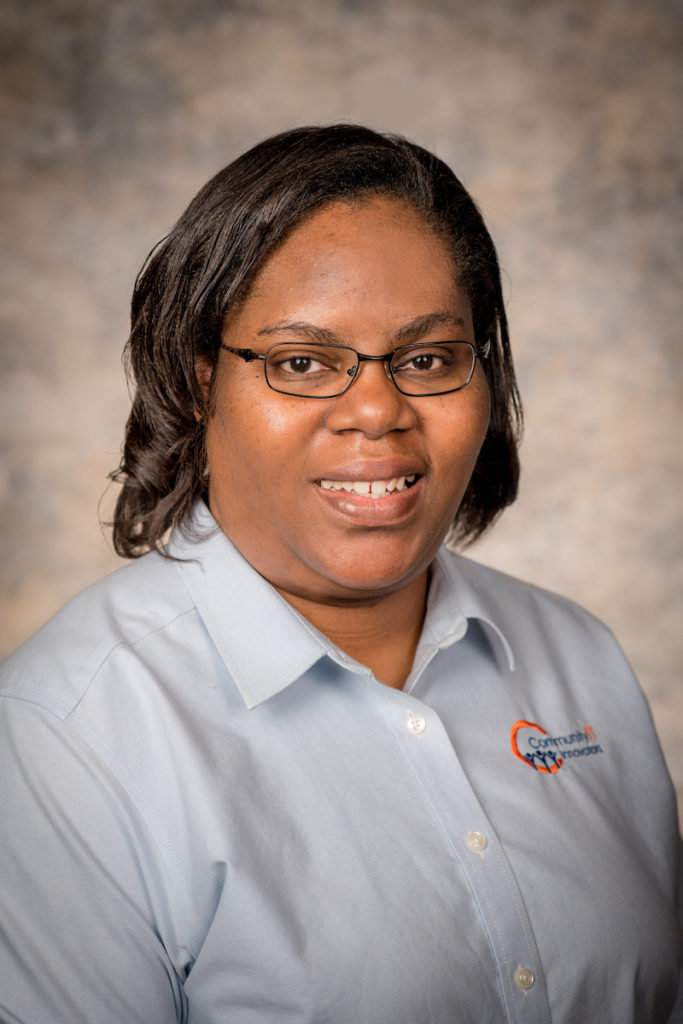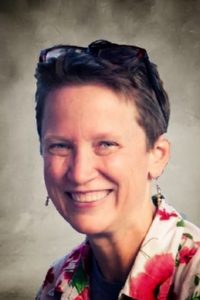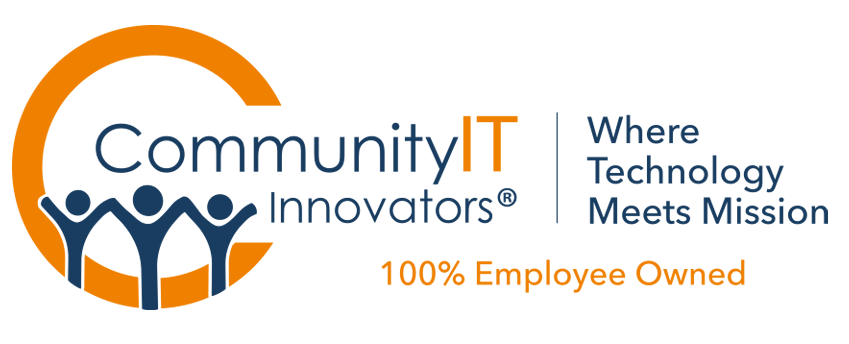Transcript below
View Video
Listen to Podcast
Like podcasts? Find our full archive here or anywhere you listen to podcasts: search Community IT Innovators Nonprofit Technology Topics on Apple, Spotify, Google, Stitcher, Pandora, and more. Or ask your smart speaker.
Update!
Since this recording, Robin was promoted to Cloud Technology Engineer. Congratulations, Robin! You can catch up with her career path and what she is working on now here.
Community IT Voices: Robin Harris, Senior Help Desk Analyst
Join us for our series featuring interviews with Community IT employees. In this series, we will talk about nonprofit technology career paths, career resources, skills, and certifications. We will also touch on mentoring opportunities as you start out on your career and ways to give back if you are further along.
In today’s interview, Carolyn talks with Robin Harris, Senior Help Desk Analyst, who has been with Community IT over a decade. Robin answers the help desk phones, emails, and live chat. Her mission is to help clients become more comfortable using technology. When problems arise, her approach is calm and caring and she aims to eliminate anxiety. Prior to joining Community IT Innovators, Robin worked at a local charter school for 10 years. She says there is no such thing as a “typical day” on the Helpdesk team, and that they are united in loving puzzles and getting to solve the causes of the problems clients encounter.
Robin discusses her career path, what makes the Help Desk team such a great place to work, and what making a career switch from education to tech support involved.
NOTE: in 2022 Robin was promoted to a new position as Engineer, specializing in SharePoint migrations, implementations, and other tech project work. Stay tuned for a new interview with her about her new responsibilities and the ways Community IT supports careers within and between our teams.
Speakers:

Robin Harris has been with Community IT Innovators for over a decade, and has worked up through different positions at the Helpdesk to Senior Help Desk Analyst and now Engineer with the projects team, specializing in SharePoint migrations and implementations.
As Help Desk Analyst she was responsible for ensuring clients pursuing their important nonprofit missions can get back to work quickly when something goes wrong with the IT.
Prior to joining Community IT Innovators, Robin worked at a local charter school for 10 years. Coordinating technology at that school was her favorite and most rewarding part of her job, which led her to make the career change to supporting IT full time at Community IT. Robin enjoys being able to work in the Information Technology field while contributing to the overall missions held by nonprofits. Church, children, knitting and Star Trek occupies her time when she is not working. Robin has A+ certification, and is pursuing Microsoft Certified Professional certification.

Carolyn Woodard has served many roles at Community IT Innovators, from client to project manager to marketing. With over twenty years of experience in the nonprofit world and marketing, including as a nonprofit technology project manager and Director of IT, Carolyn knows the frustrations and delights of working with technology professionals, accidental techies, executives, and staff to deliver your organization’s mission, keep your IT infrastructure operating, and your website live.
Carolyn is excited to help manage Marketing at Community IT Innovators and is always looking for new ways to tell stories and reach people. She has a master’s degree in Nonprofit Management from Johns Hopkins University and received her undergraduate degree in English Literature from Williams College. She thinks the best thing about being with Community IT Innovators is the people.
Transcript
Welcome to Community IT Voices, a series featuring interviews with nonprofit IT professionals. In this series, we will talk about nonprofit technology career paths, career resources, skills, and certifications. We will also touch on mentoring opportunities as you start out on your career and ways to give back if you are further along.
Carolyn: All right. My name is Carolyn and I’m here with Community IT Innovators interviewing Robin about her career path in nonprofit technology. If you just want to introduce yourself and how long you’ve worked at Community IT?
Robin Harris: I have been at Community IT for 10 years and about seven months. I just love this place. I came here from working for a public charter school. I was there for 10 years as well, from its inception, and I was their first technology coordinator. Although that’s not where I started, I finished as a technology coordinator.
Carolyn: What’s your title at Community IT? What do you do?
Robin Harris: I am a Senior Help Desk Analyst. I’ve been on the help desk now for approximately six years.
Carolyn: What are your responsibilities?
“There is no typical day.”
Robin Harris: I manage tickets that are assigned to me via email, as well as receive calls and chats to assist clients with their technology issues.
Carolyn: What sort of things do you do on a typical day?
Robin Harris: On a typical day, I — there’s no typical day. So for the most part, I am assisting clients with whatever stops their work be it an interruption in their email, something has gone wrong on their computer, or even with services, cloud services that they need to access. Whatever stops their work or keeps them from being able to continue through their day.
Carolyn: Are there some really strange things that stick in your mind? Without naming the innocent? Is there kind of a greatest hits of things that you’ve had to help someone with that you could help them?
Robin Harris: I don’t know that there’s any one thing. I mean, it seems to me that every single day is different. So nothing really comes to mind as being the strangest, but probably the most memorable things are when you realize that everybody is experiencing the same thing.
So there could be a day where everybody is calling and saying that they can’t access their email. And maybe Office 365 has one of their one-off downtimes where something has gone wrong with their servers and true enough nobody can access email. So those are strange and it’s kind of off-putting because you can’t really help the client except to manage their expectations about when the service is going to come back up.
Carolyn: What would you say are the best things about what you do at Community IT?
Robin Harris: I think probably the best thing for me is that no day is the same. Like I said, I haven’t had two days ever that are the same as each other. So that’s probably the best thing; the variety is.
Carolyn: I guess it sounds too, like having the experience that you do, it also sounds like a good part of your job is being able to help people when maybe they’re not expecting anyone to be able to help them, and you have the experience.
Robin Harris: Right, right.
“We all love a good puzzle.”
Carolyn: You can help them out. What’s one thing about your job that we probably don’t know that you’d like others to know about working for a help desk?
Robin Harris: Probably the key thing about our help desk is that all of our technicians enjoy a good puzzle. We all love to dig in and get the solution for the problems that our clients call with and sometimes they are unique and when they are unique we have the ability and the freedom to consult each other amongst our team and discuss this new thing that has happened. Has anybody seen something like this before and we name it and somebody will say, “Yeah, that happened to me last week.” The free exchange of information is wonderful but yeah, we all love a good puzzle.
Carolyn: That’s interesting that you say the team orientation too, because I think if I thought of a stereotype of the help desk technician, it would be the lone person who comes in and is maybe not all that friendly, perhaps.
Robin Harris: Right, right.
Carolyn: I love the idea that you guys operate as a team and use each other as resources and really enjoy talking to the people and getting to the bottom of their problems.
Robin Harris: Right. I think I had that wrong when I first started here, I thought that I’d just be assigned to a client and it was up to me to gain my own knowledge and figure out the problems without much help. I thought I needed to know it all, but it’s the best setup for how teamwork actually shows up in the workplace.
I think before, teamwork was kind of a buzzword – one of those things you say in interviews. But we really do work as a team here. So it’s wonderful.
Carolyn: Look, that is a great segue, because my next question is: Why did you apply to Community IT and what was it about Community IT? [What made you] go through the interview and start to work here, meet, apply and take the job?
Robin Harris: Well, as I mentioned before, I was at a public charter school for 10 years before I actually began working at Community IT. Maybe three or four years before, we were clients of Community IT. Getting to know our sys-admin and understanding, he would tell us different things about Community IT, and how they were employee owners and about the teamwork somewhat. I didn’t really understand it the way I do now and how things are organized here.
But yeah, it was the place for me. Even then, I used to wonder about whether or not it could be a fit for me and whether or not I could do IT all day long because at that time, when we were clients, IT was a small part of my job. But of course, it was the part of my job I loved the most. So it was a great opportunity that arose when I was ready to make that jump, and I reached out to our former tech and he said, “Yeah, you should apply.”
Carolyn: That is a great segue into my next question, which is kind of looking at it from the other side. What do you think it was about your background and experience that made you a good fit for the people interviewing you and hiring you? What was it about you that stood out, do you think?
Robin Harris: Probably my willingness to learn about new technologies. I was primarily a Mac person before joining Community IT. I didn’t have much experience with Windows, which also made me nervous about taking this job. But I think they saw my ability to jump in and learn a new technology. I have always been into technology and into learning what makes things tick behind the scenes.
I tell a funny story about when I was nine, my parents got me at an Easy Bake oven and I took it apart, because I wanted to know what was in there that made these little disgusting cakes bake!
Carolyn: Wasn’t it a little light bulb in there?
Robin Harris: Yes! I discovered a light bulb; I discovered a lot of things. But that was when my mom said she knew that I was to do something that had to do with making things.
“Go love people first and love helping regardless of what your affinity is.”
Carolyn: It sounds like you were interested in technology, but like you said, not sure if that could be your full job. If you were talking to the you in high school, or someone else in high school, who was thinking about working in technology, or specifically in nonprofit technology support, is there any advice that you would give them? What they should do to prepare or what kind of personality or interests would be helpful?
Robin Harris: I would think that the person that works here at Community IT should go love people first and love helping regardless of what your affinity is, as far as technology is concerned. An affinity towards technology is of course key, but wanting to help somebody through their frustration, whatever the situation, is a key skill that I tap into daily.
Carolyn: Is there anything about your job that you thought you knew going into it, then it turned out you were totally wrong?
Robin Harris: I think primarily, the aspect of: you’re not alone. Here, there’s the team approach to everything that we do, but also there are resources online. There’s resources that you could tap into to gain more knowledge. There’s certifications you could get. A-plus is the starting place for most IT folks, as far as certifications are concerned, because it gets you into the insides of the computer and learning how to do some basic troubleshooting. That way, you would know whether this is something you like or not.
Carolyn: So that’d be your advice – to start early getting involved in what you’d be doing. Yeah. That makes sense.
And then, on the flip side, we’ve been talking a little bit about when people are starting out thinking about a career or, when you started at Community IT, but you said you’ve been there for a decade. Do you have an idea of, when you retire from Community IT, what sort of position you’d like to have, or what you would like your legacy at the Community IT to be?
Robin Harris: I think I’d still like to be helping people. I’d still like to at least be talking to clients every day and perhaps about more complex issues that I could be helping with, but talking to people is what I enjoy.
“Do you have any words of wisdom for what makes a nonprofit technology job so great and worth pursuing?”
Carolyn: Exactly. It sounds like you do have a good life. You have a great team, you have a lot of support. If you were giving advice to someone else in nonprofit technology or just a technology job who maybe isn’t getting that sort of support from the people around them, do you have any advice on where they can go for support in our industry?
Robin Harris: To be honest, starting with just Googling your issue. It turns out there’s not a question I’ve ever asked on Google that hasn’t already been at least asked, sometimes even resolved. So starting there to tap into message boards and like-minded people is probably the place I’d start. Try to get somewhere like Community IT, where we help each other. I’ve never been turned away by any of my colleagues for a question that I can’t solve.
Carolyn: Right, right. I think we’ve been talking about this very specific subset of technology jobs that is support for nonprofits which is what Community IT does. And I imagine that people who are going into technology may have some questions or doubts about taking a nonprofit support role, as opposed to some other career paths. Do you have any words of wisdom for what makes a nonprofit technology job so great and worth pursuing?
Robin Harris: It is wonderful to be able to help organizations whose first goal is not technology. They’re out changing the world in their own small way or large way, more often. It’s wonderful to be behind that, to be able to say that we helped with whatever their mission is in our unique way.
Carolyn: So it sounds like if that’s something that people are pursuing, that sense of helping, that this is a good way to combine maybe an interest in technology and the desire to help others and serve.
Robin Harris: Absolutely.
Carolyn: I have one more question which is: when you tell people you work at Community IT, I’m sure when you say that you work at a help desk, even if people have some misconceptions about it, they pretty much know what that is. But when people ask about Community IT, what do you tell them, what does Community IT do?
Robin Harris: One of the things that we learn as we are being oriented to Community IT is that first and foremost, Community IT is a customer service company which means that we should approach everything as if we are providing our customer with a service and to actually have them be able to walk away from the experience with a smile and with a sense of relief that there’s some problem has been resolved. So that’s primarily what I tell folks, so we’re a customer service organization that provides assistance for IT issues.
Carolyn: Thank you so, so much for spending time with me today. It was so interesting to learn about what you do, and I just thank you again for participating.
Robin Harris: Well, thank you for having me.
We hope you enjoyed this Community IT Voices interview with Robin Harris. Community IT is the right place for you if you find fulfillment in helping others succeed and love mastering new technologies.
Our employees stay and grow with us, and over half of our staff have been with us for over a decade. Community IT is an employee-owned company with a positive, sustainable workplace that promotes professional development and a healthy work/life balance. We have been 100% employee-owned since 2012. Check out careers with us here.
